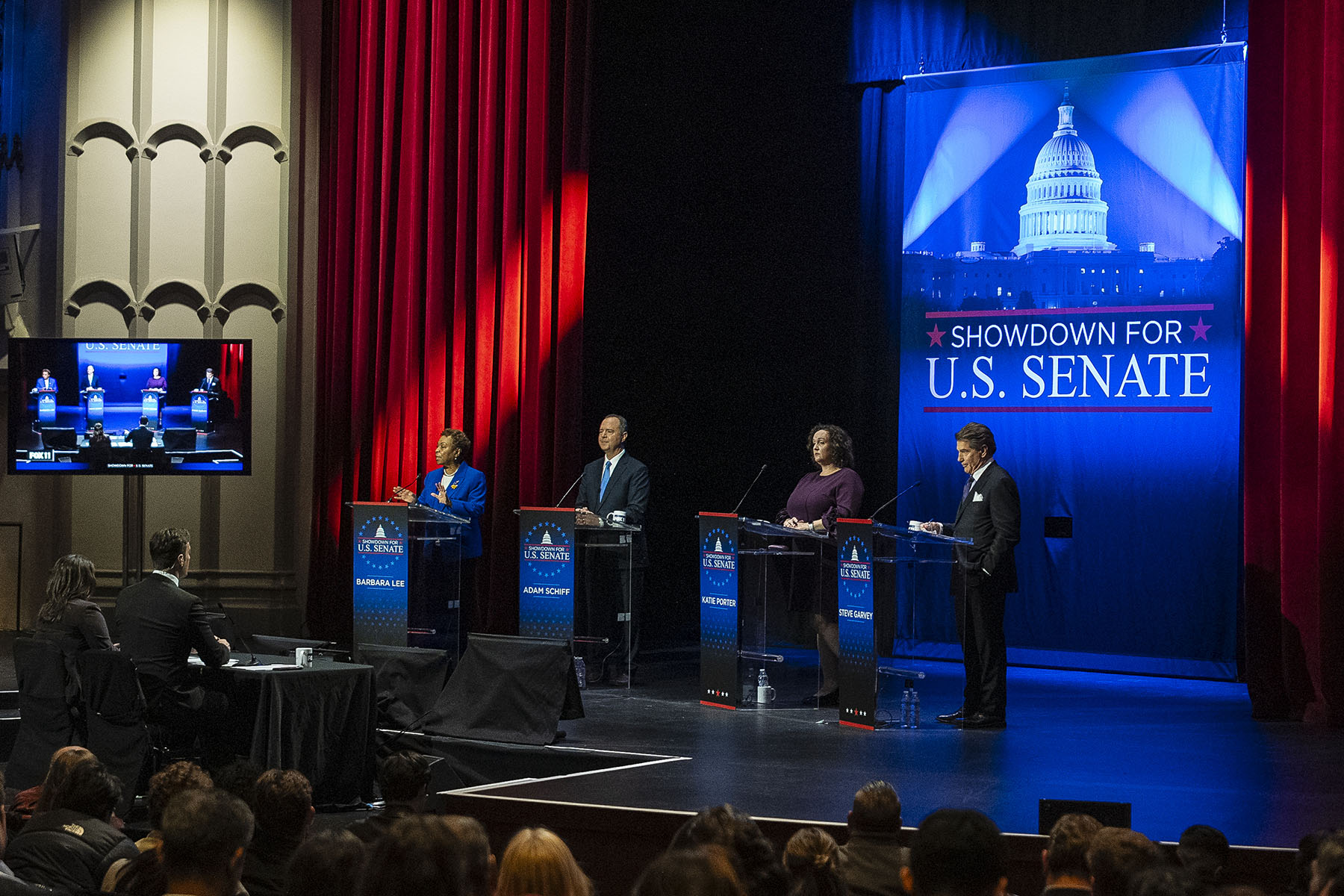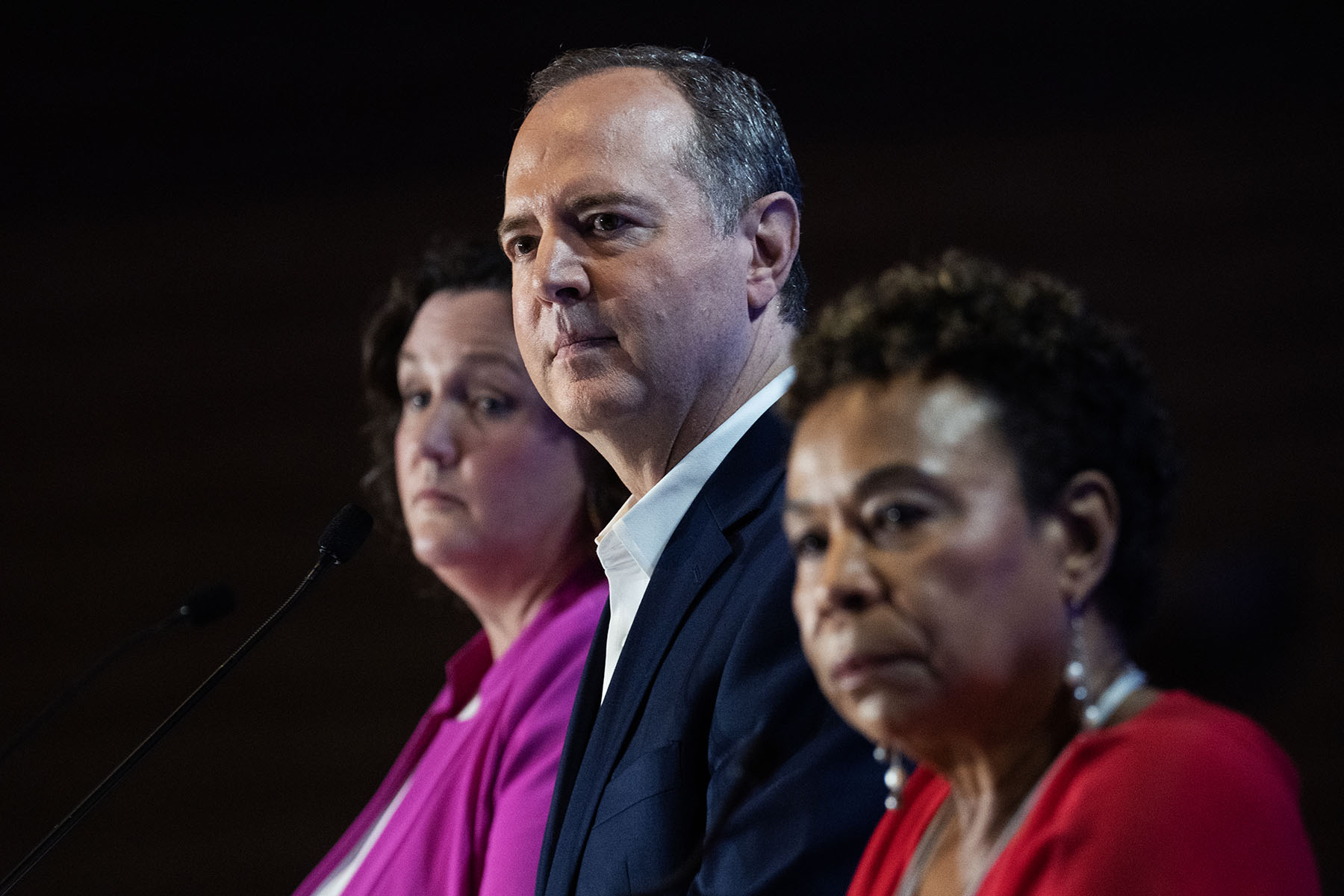In 1992, Californians voted Dianne Feinstein and Barbara Boxer into the U.S. Senate, making it the first state with two women in the upper chamber and driving what became known as the “Year of the Woman.”
Ever since, California has had at least one woman in the Senate: Boxer’s 2017 retirement was followed by the election of now-Vice President Kamala Harris. Though Harris’ vacated seat was subsequently won by Democratic Sen. Alex Padilla, Laphonza Butler was tapped to temporarily fill in for Feinstein after her death in September 2023.
Now a competitive nonpartisan primary is underway to determine which two candidates will be on November ballots to potentially win a full six-year term. Public polling shows Rep. Adam Schiff leading in what has become a race between three House Democrats and one Republican. Rep. Katie Porter is neck-and-neck for second place with Republican Steve Garvey, a former professional baseball player. Longtime U.S. Rep. Barbara Lee rounds out the top tier.
If neither Porter nor Lee finishes in the top two and advances to the general election, California will find itself without a woman in the Senate for the first time in more than 30 years.
With nearly a third of likely voters undecided just three weeks out from the March 5 primary election, there is still the potential for a last-minute shakeup of the field. But a primary debate on Monday night — the second of three — offered little indication that it might change the trajectory of the race as the four candidates tread largely familiar ground: Schiff portrayed himself as a defender of democracy who has held Donald Trump accountable; Porter explained that she thinks about policy through the lens of a single mother; Lee highlighted how her lived experience informs her progressive record; and Garvey continued to make the case it was time for new representation in Washington.
-
Previous Coverage:
Schiff, 63, has an astounding $35 million in his campaign coffers — the result of a national profile built when he managed Trump’s first impeachment trial and served on the special committee that investigated insurrection at the U.S. Capitol on January 6, 2021. In some of his answers on Monday night, he chose to direct his attacks at only Garvey — a tactic that some of Schiff’s Democratic critics say needlessly elevates the Republican’s profile at the expense of Democratic contenders. Schiff could handily win a head-to-head general election matchup with Garvey given California’s liberal electorate. Polling done by Porter’s campaign, meanwhile, shows her besting Schiff by more than 10 points if the two Democrats are on November ballots.
Porter, in turn, focused her attention on drawing contrasts with Schiff. The 50-year-old divorced mother of three is running as a fresher face in the Democratic Party. In 2018, Porter flipped her district in Southern California’s Orange County amid a Trump backlash that sent a record number of Democratic women to the House, prompting pundits to declare it a second “Year of the Woman.”

A consumer protection attorney, Porter has become known for the whiteboard she brings to congressional hearings, where she grills chief executives in a manner reminiscent of her legal and political mentor, Democratic Sen. Elizabeth Warren of Massachusetts. Porter reminded those watching the debate that the vanity plate on her minivan reads: “OVRSITE.” In answering a question from debate moderators about housing costs, and why it wasn’t until this month that she released an affordable housing plan, Porter said her children were worried they would not be able to stay in California.
As the candidates debated on Monday, a new cryptocurrency-linked super PAC that aims to impact proposed industry regulations and has $80 million to spend on the 2024 elections began reserving television space to oppose Porter’s candidacy, The New York Times reported, noting that Porter signed onto a letter Warren sent to Texas regulators related to cryptocurrency and climate change. “Shadowy crypto billionaires don’t want a strong voice for consumers in the Senate. They fear people who call out corporate greed,” Porter posted on X, responding to the ad buy.
Lee, 77, used Monday night’s debate to continue to tie her personal experiences to her progressive record. In answering the question on housing, for example, Lee nodded to the fact that she is the only candidate who has experienced being unhoused. She also noted that she is the lead plaintiff in a civil lawsuit against Trump over the insurrection.
Since Lee’s election to her Bay Area district in 1998, she has been a consistent progressive, even when it has put her at odds with her own party. Lee has long supported a Medicare-for-All health care system and frames climate change as an issue of racial and gender justice. She was the only lawmaker in Congress to vote against authorizing the use of military force in the wake of the September 11 attacks, saying it was a “blank check to the president to attack anyone involved.” She was the first top-tier California Senate candidate to call for a ceasefire in Gaza amid the Israel-Hamas war.
Lee, who is aiming to be the third-ever Black woman elected to the Senate, has said throughout her political career and when launching her Senate campaign that “representation matters.”
Garvey’s main line of attack in the debate, as in the rest of his campaign, is that his Democratic competitors are career politicians. In answering a question about presidential age limits, the 75-year-old motivational speaker and former player for two California Major League Baseball teams — the Los Angeles Dodgers, then the San Diego Padres — was the only candidate on stage who declared President Joe Biden, 81, too old to run for reelection. Garvey did not definitively say whether he would again vote for Trump, who is 77, after doing so in 2016 and 2020. He also avoided providing many policy specifics. With weak fundraising — only about $600,000 came in during the fourth quarter of last year — he is at a significant resource deficit compared with his Democratic opponents.
Early voting is already underway in California. To participate, voters must register by February 20, when a third and final Senate primary debate will be held. Due to California’s decade-old, top-two or “jungle” primary system, the two candidates who get the most votes March 5 will advance to the general elections in November, regardless of political party.







